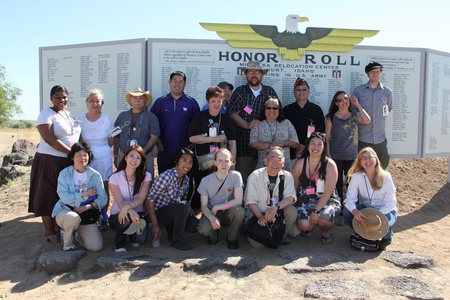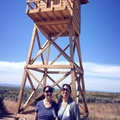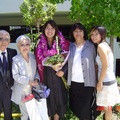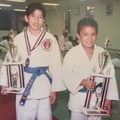Today I received the news that my friend and fellow Minidoka Pilgrimage Planning Committee member passed away. Frank was 2 years old during World War II when his family was told to leave Bainbridge Island and go to the Manzanar War Relocation Center in California and later sent to the camp called Minidoka in Idaho. To me, Frank was my elder, a man I respected and looked for guidance and wisdom. With his passing, I can’t help but reflect what the Minidoka Pilgrimage Planning Committee has meant to me over the years.
I joined the Minidoka Pilgrimage Planning Committee in 2009 when I was a graduate student and received a scholarship to attend the pilgrimage. I am a Yonsei, fourth generation Japanese American where my great grandparents were the first to immigrate to this country in the late 1800s. My family was incarcerated at several camps during WWII: Tule Lake in California, Gila River in Arizona, and Heart Mountain in Wyoming. My grandfather enlisted in the U.S. Military Intelligence Service. But like most other Japanese Americans, my family did not talk about the incarceration experience although it has impacted us and our communities during World War II and continues to this day.
As a kid I spent a lot of time at my auntie’s house where also lived my grandfather and his sister, my great aunt, who I consider my obachan (grandma). If I could characterize my interactions with my grandparents I would say we were always polite, obedient, and with very few words exchanged. This is where I mastered indirect communication. I could tell my grandparents wanted to know about my parents, about us children, and our upbringing, but didn’t know how to talk to us and I didn’t know how to talk to them. One day my obachan waved a can of soup and said to me, “Is this what your mother makes you?” I nodded and then she started to shake her head and mutter to my grandpa in Japanese. I know they thought we lived like barbarians back at home with my two working parents.
When my parents were going through hard times I spent the summer with my grandparents. My grandpa wouldn’t say anything but once a week he would plan an outing for us. He would walk out of his room and tell my brother, sister, and I to get in the car. He took us to his favorite lake, the mall, the movies, the zoo, and the beach and fishing pier. One of the funniest moments was when he turned on the car and started playing the Mexican radio station. Then after a while on the road he looked at me and said, “Is this what your mother plays to you?” I looked over to my brother and started smiling. My mother is Mexican and I think that’s what brought a lot of confusion and speculation from my grandparents. I told my grandpa I don’t listen to that kind of music and reminded him we don’t know Spanish. He nodded his head and changed the station.
Fast forward to 2009 and attending the Minidoka Pilgrimage. I was a transplant to Seattle from Los Angeles and thought going to this pilgrimage would help me connect to my roots and also to learn about the Japanese community from the Pacific Northwest. The Minidoka Pilgrimage is a four-day trip in Twin Falls, Idaho where we visit the former Minidoka concentration camp which was one of ten concentration camps in the United States for people of Japanese ancestry. We offer an option to take a coach bus for twelve hours from Seattle, Washington to Idaho. What happens on this bus ride to and back from Minidoka is transformational and hard to explain. Yes, it’s exhausting, but allows a moment to bond with a group of strangers where we share stories, watch war related films, and be together through the entire journey.
On the Minidoka Pilgrimage I was able to understand and find solace in the issues that have impacted the Japanese American community for generations. I was able to have the inter-generational dialogue and the tough conversations I didn’t realize I was craving. When I walked on the grounds of the Minidoka camp I found myself gravitate to a woman that looked like my obachan. I asked her how she was feeling being back at Minidoka. I expected her to say she was fine or having a good time but instead she looked at me and said, “I’m angry. Why did they have to send us here?”
After talking to her I thought of my own grandma who was my age in camp, and in this crappy, desolate location. Angry and sad tears came down my face as I closed my eyes and sent a prayer to my grandma. I could now see the trauma and racism my ancestors experienced in this country, and being on that land made me feel closer to my ancestors.
My plan after the pilgrimage was to talk to my grandfather. I was going to tell him all about the trip and for us to talk more about our family experience in camp and after camp. I wanted to ask for his permission to request from the United States National Archives our family members’ war relocation authority files where I could get all of their documentation during camp. Yet I never got to ask my grandpa. On July 18, 2009 I was volunteering for the Minidoka Pilgrimage Committee at the Seattle Buddhist Temple during their Bon Odori festival when I received the news from my dad that my grandpa had passed away.
I had a hard time opening up to others about my grandpa’s death. Again I was reminded by my indirect communication style and how my grandparents and I liked to bury our emotions and be stoic. I lied to my boss and co-workers saying I needed to go home for vacation instead of the reality that I was going back for my grandpa’s funeral.
In my own healing process with my grandpa’s passing, I decided to stay involved with the Minidoka Pilgrimage Planning Committee. Every year I attend the pilgrimage, I cry. I miss my grandpa. But I also laugh and smile. Every year I find community, compassion, and kinship.
At the end of the Minidoka pilgrimage two years ago I was waiting at the airport in Idaho to return to Seattle with a group of the community leaders including Frank. Together we strategized and discussed the importance of the pilgrimage and what we saw for the future. I was in awe of these elders who were the leaders in the community and who included me in this process. Then the elders shared with me how the community is changing. The elder generation who was in camp has been dying off by the minute. They foresaw the pilgrimage having to change with the next generation and they were going to need me to help take over with the leadership. I shrugged and shook my head at their suggestion. I believed they shouldn’t be talking like that and they would be here for many more years to continue on the pilgrimage.
Not too much later, I was asked by the Minidoka Pilgrimage Planning Committee to co-chair the committee. I could hear my grandfather in my ear, encouraging me to do it, and I said yes. With the support of Frank, the other pilgrimage committee members, and my community, I am happy to be part of such a great group of people.
I didn’t know what I was signing up for back in 2009 by going to the Minidoka Pilgrimage, but in the process I was able to learn more about my family, my community, and finding my voice. It is important for me to continue the legacy of my grandpa and my ancestors, and now also people like Frank and those I have met on the pilgrimage who have passed on.
For more information about the Minidoka Pilgrimage, please visit www.minidokapilgrimage.org. The 2014 Minidoka Pilgrimage will be from Thursday, June 19, 2014 to Sunday, June 22, 2014.
© 2014 Chanda Ishisaka






